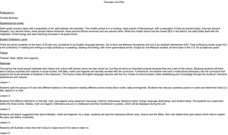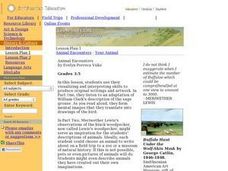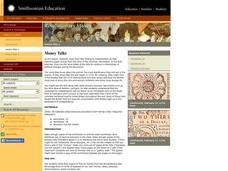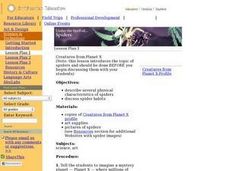Curated OER
Manifest Destiny
In this Westward Expansion worksheet, students read assigned textbook pages which describe Manifest Destiny and respond to 33 short answer questions.
Curated OER
Chapter 26 – The 1960s & 1970s Counterculture
For this 1960's and 1970's America worksheet, students read assigned textbook pages regarding the counterculture and respond to 41 short answer questions.
Curated OER
Memo from the Governor
Fourth graders inquire about the history of Florida's capital after receiving a mock memo from the governor.
Curated OER
What's the Problem?
Fourth graders redefine the problem of Where's the Heart of Florida? and begin to formulate possible solutions using graphic organizers.
Curated OER
Cocina Mexicana
Young scholars research authentic Mexican food recipes on the Internet and translate them into English noting any new vocabulary. They present their recipes and vocabulary to the class.
Curated OER
Legends and Myths: Trickster Tales
Students work in groups to research the characteristics of various myths and legends. They read tales, illustrate them, record oral storytelling efforts and write an original folktale. Students then invite parents to a dramatic...
Curated OER
Letters from Lincoln
Fourth graders explore the childhood of Lincoln and pioneer life in early Indiana. Students respond to literature and write a story using historical fiction. Students explore the writings of President Lincoln and the pioneer community...
Curated OER
Ethnic Groups in World War II
Students discuss the contributions of various ethnic groups during World War II prior to visiting the George Bush Gallery of the Pacific War. After the visit, they interview veterans about prejudice during the war or listen to a guesst...
Curated OER
Lewis and Clark: The Language of Discovery
Young scholars replicate some of the trailblazing methods of Lewis and Clark on a fifteen-minute "writing journey" through the school or neighborhood.
Curated OER
Animal Encounters
Students use their visualizing and interpreting skills to produce original writings and artwork.
Curated OER
How Things Fly
Students observe photographs of selected twentieth-century aircraft at the National Air and Space Museum and note differences in the design of aircraft wings, fuselages, and engines.
Curated OER
How Things Fly
Students, by drawing on their own experiences, discuss and examine the basic physics of flight. They participate in a variety of activities regarding flight.
Curated OER
Stories of the Wrights' Flight
Students examine and compare primary and secondary source accounts of the Wright brothers' first flights on December 17, 1903.
Curated OER
Money Talks
Students move from fact finding to interpretation as they examine paper money from the time of the American Revolution. In the final exercise, they use the issue dates of the bills to construct a chronology of political changes during...
Curated OER
Pictures Telling Stories
Students see the importance of primary sources in the study of history, but also the limitations of relying only on primary sources of taking the money, as it were, at face value.
Curated OER
The Rocky Shore
Students compare a realistic landscape painting with a photograph of the same place.
Curated OER
"The Universal Principal of Change"
Twelfth graders research the Kamakura Period, along with Confucian, Taoist, and Buddhist principles. Also, they study Yoshida Kenko.
Curated OER
Ethnic Groups of Utah
Students examine the many different ethnic groups of Utah and their contribution to society. They research the different ethnic groups using the Internet and answer questions.
Curated OER
Spy on a Spider
Students view slides or live specimens to name and describe the distinguishing features of groups of arthropods, especially spiders and insects. They complete worksheets, observe webs and then search for and record where spiders can be...
Curated OER
Creatures from Planet X: Spiders
Students are given a description of some fascinating animals from "Planet X". They follow the descriptions given to illustrate one of these animals paying careful attention to introduced vocabulary such as 'appendages', 'receptors', and...
Curated OER
Facts, Feats and Folklore: Spiders
Students review and discuss a variety of sayings, folklore and superstitions about spiders. They discuss this information and choose either an interesting fact or appealing foklore tradition to illustrate.
Curated OER
The Homestead Act
Eighth graders analyze the Native American's viewpoint of the Homestead Act. Using one Native American group who lived in Nebraska, they write a letter to the editor of a local newspaper discussing the Homestead Act and how it affected...
Curated OER
African American Homesteaders
Students analyze the reasons African-Americans settled in the area to be known as Nebraska. Using primary source documents, they read about the challenges they faced and compare their growth and distribution of African-Americas in the...
Curated OER
Letters from the Japanese American Internment
Students make deductions about life in an internment camp by reading and comparing letters written to Clara Breed. Along the way, they consider the advantages of looking at a historical event from the multiple points of view of...

























